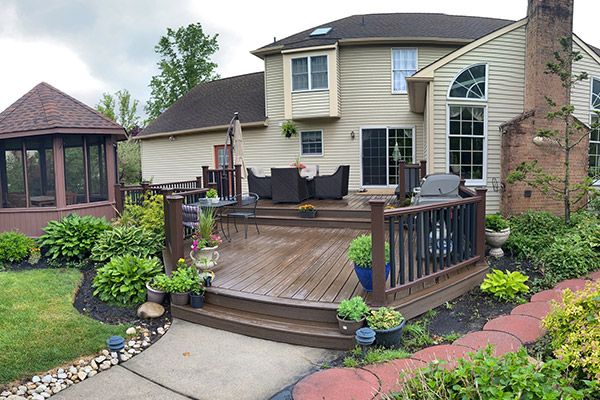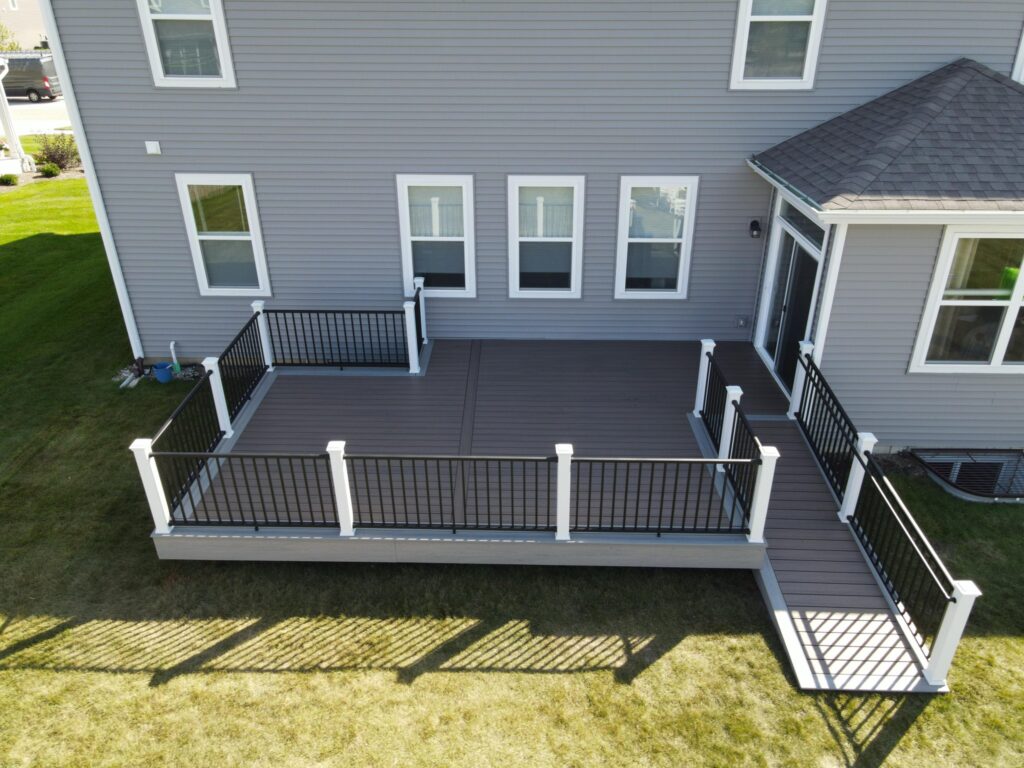Exploring Numerous Types and Advantages of Deck: A Comprehensive Overview
The outside deck is greater than simply an extension of one's living area; it's a testament to individual design, a venue for social gatherings, and a refuge to loosen up. The selection of outdoor decking product significantly influences these facets, with choices varying from the traditional allure of timber to the usefulness of composite, and the sturdiness of aluminum. Understanding the nuances of these materials is crucial, so allow's begin our expedition, one deck type each time.
Comprehending the Fundamentals of Decking Material
Outdoor decking material functions as the backbone of any kind of deck job, determining the overall looks, resilience, and performance of the end product. The marketplace supplies a large variety of materials, each with distinct features fit to numerous style choices and ecological problems. The selection includes natural timber, composite, plastic, aluminium, and even concrete. Wood, being the traditional selection, provides an ageless, timeless appeal. Compound, a combination of timber and plastic, uses wood-like appearances with much less upkeep. Plastic and aluminium supply contemporary, minimalistic options, while concrete is favored for its unparalleled durability. The option of material dramatically affects the deck's life expectancy, upkeep requirements, and resistance to elements. Understanding the basics of decking product is crucial for an effective deck task.
Advantages and Downsides of Timber Decks
In examining deck types, recognizing the benefits and drawbacks of timber decks comes to be essential. This involves thinking about factors such as the kind of timber chosen and its influence on the deck's efficiency. The subsequent conversation will certainly discover these points carefully to provide a detailed view of the drawbacks and benefits related to timber decks.

Wood Deck: Cons & pros
The beauty of timber decks can not be overemphasized. They show an ageless charm and warm aesthetic that many homeowners discover tempting. This natural material is flexible, permitting a variety of style opportunities, and can offer an outstanding return on investment.
However, timber decks additionally come with specific downsides. Its longevity can be much less than various other decking materials, specifically if not effectively cared for.
Choosing Your Wood Kind

Discovering the Benefits of Composite Decking
Transforming attention to composite decking, it provides special advantages. Its resilience exceeds conventional wood in severe weather conditions, lowering the requirement for constant maintenance. Additionally, it supplies a pleasing visual charm with variable layout alternatives.
Compound Decking Durability Advantages
Despite the plethora of outdoor decking alternatives readily available in the marketplace, composite decking sticks out for its toughness. This sort of outdoor decking, made from a mix of wood and plastic, offers a resilient, resilient system immune to elements that commonly degrade various other products (Local Deck Builders Near Me). It doesn't splinter, warp, or split, guaranteeing a constantly smooth surface for years. It's immune to damage from bugs such as termites, contributing to its durability. The inherent resistance to fading, discoloration, and damaging is an additional remarkable advantage. This makes it a suitable choice for outdoor areas or high-traffic locations revealed to severe weather. In summary, the longevity benefits of composite decking provide a sustainable, cost-efficient service for outside living areas.
Upkeep of Composite Decks
Along with sturdiness, composite decking flaunts a major advantage in terms of upkeep. Unlike traditional timber decks, composite decks are not at risk to rot, warp, or insect damages, hence substantially decreasing the demand for normal repair work and replacements. They additionally need no sanding, staining, or painting, making them a time-saving alternative for house owners. Cleaning a composite deck is a simple job, usually just requiring a move or a mild clean with a light soap and water. The low-maintenance nature of composite decks not only supplies simplicity of maintenance but additionally adds to their long-term cost-effectiveness. This useful advantage, incorporated with the material's fundamental resistance to weathering and decay, makes composite outdoor decking a recommended selection for numerous individuals seeking a sturdy and problem-free decking remedy.
Visual Appeal and Variability

The Climbing Popularity of Aluminum Decks: Why Choose Them?
As the need for low-maintenance and resilient decking rises, aluminum decks are increasingly becoming the go-to alternative for numerous house owners and building contractors. These decks, made from a lightweight yet strong metal, supply a number of advantages over traditional wood or composite decks. To start, aluminum is naturally resistant to the aspects, meaning it won't warp, fracture, or discolor in time. This makes it a cost-efficient choice in the future. Furthermore, its non-porous surface area prevents the development of pests, mold and mildews, or fungi, ensuring a healthy and balanced and tidy outside room. Light weight aluminum decks are also eco-friendly, as they are usually made from recycled materials and can be recycled once again at the end of their life expectancy. Finally, their sleek and modern visual allure fits well into contemporary home styles.
Upkeep Tips for Different Decking Materials
Regardless of the selection of decking materials offered on the marketplace, each comes with its very own collection of maintenance demands to guarantee longevity and visual charm. As an example, natural wood decks require normal discoloring or securing to protect against weather damage, while composite decks require regular cleaning with soap and water to eliminate discolorations and debris. On the other hand, light weight aluminum decks require less upkeep, just needing periodic rinsing with water to maintain them tidy. Dealt with timber decks, although immune to rot and bugs, additionally need regular sealing to keep dampness out. Consequently, understanding these maintenance requires is essential for deck proprietors to maximize their financial investment and keep their decks looking their best for several years ahead.
When Picking Your Deck Kind, variables to Take Into Consideration.
Composite decks stand up to moisture well, making them excellent for damp or stormy areas. While some might desire a lavish, exotic timber deck, budget restraints could require an extra economical choice like pressure-treated wood. Hence, environment, price, way of living, and upkeep are vital factors to consider in deck selection.
Conclusion
Timber decks charm with all-natural appeal, while composite and aluminum varieties offer durability and reduced upkeep. Prior to committing to a certain deck kind, house owners need to thoroughly think about the benefits, downsides, and upkeep demands of each material.
In evaluating deck kinds, comprehending the pros and disadvantages of timber decks ends up being important.Despite the plethora of outdoor decking alternatives available in the market, composite outdoor decking stands out for its sturdiness. Unlike typical wood decks, composite decks are not at risk to rot, warp, or insect damages, therefore considerably decreasing the demand for normal repair work Read More Here and substitutes. These decks, made from a lightweight yet sturdy steel, supply a number of advantages over standard timber or composite decks. Natural timber decks need regular discoloring or Homepage sealing to stop weather condition damage, while composite decks need routine cleaning with soap and water to eliminate stains and particles.